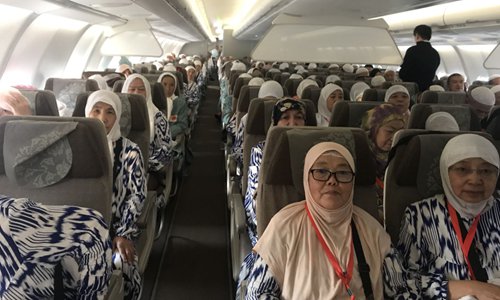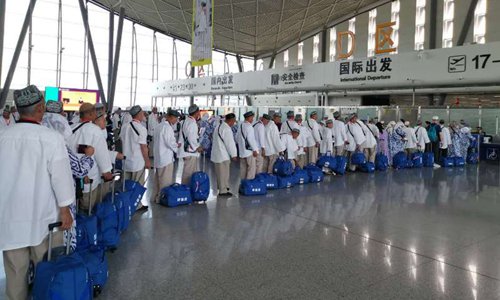Xinjiang Muslims welcome govt’s efforts on hajj journeys
Trips show commitment to religious freedom

Muslims from Northwest China's Xinjiang Uyghur Autonomous Region embark on their journey from Urumqi to Saudi Arabia for the annual hajj on July 23. Photo: Courtesy of the Xinjiang pilgrimage group

Muslims from Northwest China's Xinjiang Uyghur Autonomous Region embark on their journey from Urumqi to Saudi Arabia for the annual hajj on July 23. Photo: Courtesy of the Xinjiang pilgrimage group
Muslims in Northwest China's Xinjiang Uyghur Autonomous Region performing hajj in Mecca, Saudi Arabia, hailed the considerate arrangements by Xinjiang government during their overseas trip.
More than 11,000 Muslims from China took chartered flights to Saudi Arabia for the annual hajj pilgrimage. The group began their journey from Urumqi on July 23, Aibaidula Saidula, head of the Xinjiang Muslim hajj group, told the Global Times.
Feng Jinzhong, a pilgrim from Urumqi, told the Global Times that he was excited to visit Mecca and Medina in Saudi Arabia for this year's hajj.
"As a Muslim, it was my dream to perform hajj in Mecca. I used to worry about managing the hajj pilgrimage since I've never gone abroad nor can I speak Arabic," Feng told the Global Times.
He noted that all his worries vanished since the government arranged the trip.
Like Feng, most of the pilgrims from Xinjiang had never traveled overseas. Many of them live in remote areas in southern Xinjiang and said that without the government's help, they would have faced language issues and other problems.
Staff arranged the pilgrims' accommodations, including a medical team and other personnel to guide them through hajj, Feng said.
"Each of us has a name card with information written in Chinese, English, and Arabic in case we get lost," Feng said.
"Hajj is one of the five pillars of Islam and an important religious activity requiring overseas travel. Organizing pilgrims to successfully perform hajj shows the Xinjiang government's commitment to religious freedom and care to religious believers," Aibaidula said.
Before heading to Saudi Arabia, Xinjiang organized lectures on traveling overseas and training on what to do during hajj. It also assigned staff to assist the pilgrims before and during the trip, including getting a visa, exchanging money, undergoing a physical examination, booking tickets and getting insurance, Aibaidula said.
Benefitting from development
Muhtatam Xirip, 55, the imam of the Yanghang Mosque in Urumqi, is one of the religious personnel and translators for the Chinese pilgrims this year. He studied in Libya and has accompanied Chinese pilgrims to Mecca for hajj on more than 10 occasions.
"I am responsible for helping the Muslims about the appropriate ways of praying during hajj. I also need to assist the medical staff for the psychological counseling of pilgrims," Muhtatam told the Global Times.
Muhtatam said completing hajj requires considerable preparation, including saving money for the fees and making other family-related arrangements.
The government's services to pilgrims have improved in recent years, with many pilgrims from other countries envious of them, Muhtatam said, adding that China's development has also helped the pilgrims perform hajj.
"When I studied in Libya funded by the government in 1989, I learned that some pilgrims need to travel to Pakistan and wait for a long time for a visa to Saudi Arabia. Now, pilgrims can get their visas within a month because of improving China-Saudi Arabia ties," he said.
Muhtatam said Chinese pilgrimage teams always make sure personnel hold a small national flag to ensure that no Chinese pilgrim strays away from their entourage, which is something that impresses him the most.
"Not only myself, many pilgrims told me that every time they see the national flag, they feel relieved since the country shields them," Muhtatam said.
In response to reports that China organizes official trips for hajj to monitor Muslims, Zhu Weiqun, former head of the Ethnic and Religious Affairs Committee of the National Committee of the Chinese People's Political Consultative Conference, said, "Those who attack China for organizing hajj trips are malicious and peddling nonsense."
Zhu noted that, historically, some Muslims in China's remote areas were poor and few of them could manage to save enough money to attend hajj in Mecca. After 1949, because of security concerns, Muslims who wanted to attend hajj in Mecca gradually turned to local government and Islamic organizations for help. In the 1990s, China began organizing pilgrims for hajj in Saudi Arabia.
"Organizing trips for hajj is welcomed by Muslims in China since better services have been offered during the trips. China's well-organized annual hajj trip has also been hailed by Saudi Arabia, which faces great pressure on transportation and other infrastructure during hajj," Zhu said.
It's more convenient for Muslims during hajj since Xinjiang is more stable and secure now, Zhu added.
News of the Chinese pilgrim group to Saudi Arabia is available on the websites of Islamic associations in different places, including the China Islamic Association.

